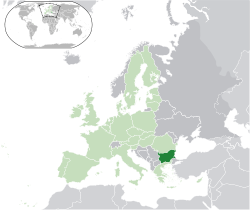Shadow Economy Remains Large In Bulgaria, Romania
By SETimes
By Svetla Dimitrova
Owners of vending machines in Bulgaria have until the end of October to equip their appliances with the needed fiscal devices to ensure proper accounting of sales. This is one of the latest measures Sofia authorities have taken with an aim of curtailing the Balkan country’s shadow economy.
A new World Bank report released on September 10th said that among the 10 East European countries that joined the EU since 2004, informal labour was at its highest in Bulgaria, accounting for 33 percent of national GDP in 2007 and lowest in Slovakia, at 17 percent. The figures for the Czech Republic, Estonia, Hungary, Latvia, Lithuania, Poland, Romania and Slovenia fall “somewhere in between.”

While the situation has improved slightly since, the Bank said it was critical that the 10 nations make further efforts to reduce the size of their informal sectors in view of the current financial crisis and the demographic changes the region is expected to face in the future.
“The governments of the new member states in Eastern Europe simply cannot afford a large shadow economy, not in the short run due to fiscal concerns, nor in the long run due to the shrinking labour force,” Katarina Mathernova, a senior adviser at the World Bank, said.
A European Commission (EC) report in June estimated the size of the shadow economy in the EU in 2011 as ranging from 7.9 percent GDP in Austria to 32.3 percent in Bulgaria. Romania was named as the country with the second highest GDP, at 29.6 percent, well above the EU average of 19.2. The figures for 11 other member states, including Cyprus (26 percent), Greece (24.3 percent) and Slovenia (24.1 percent) also exceeded the average for the bloc.
The introduction of a 10 percent flat tax in Bulgaria in 2008 was one of the reasons for the lower level of the informal sector measured in the country last year, according to Georgi Stoev, the head of Sofia-based consulting company Industry Watch.
He agreed with other experts, including the authors of the recent Bank report, in underscoring that due to its nature, the shadow economy in a country is difficult to measure precisely.
“Ever since I took my first job in economic analyses in 1998, the size of the informal sector in Bulgaria has been rated around 33 percent of GDP,” he told SETimes.
“Low taxes and fewer regulations” are essential in curtailing the level of the informal sector, Stoev said.
It is critical that formal jobs are “economically viable,” according to Johannes Koettl, Bank economist and co-author of the report. That is “currently not the case” for many with low-wage jobs in Bulgaria, Romania and other new EU member states, he told SETimes.
Because Bulgaria currently does not charge a flat tax, income taxation was only one of the elements affecting the cost of formal work, Koettl explained.
“Two other things that add to costs of formal jobs: social security contributions that workers and their employers have to pay on formal jobs; and the income-tested social benefits, like social assistance and family benefits, that workers might lose when having formal income on record,” he said.
Romania has taken certain measures to deal with the problem. One, enforced on May 1st, was to increase penalties levied on employers for unregistered employees, while stepping up inspections.
As a result, the number of legally registered workers rose by 100,000, Ramona Mara, lecturer at the Faculty of Economics and Business Administration at the Babes-Bolyai University in Cluj-Napoca, told SETimes, citing official statements.
According to her, the Romania’s labour taxation should also be reduced to cut down the level of undeclared work.
“Even if income tax is only 16 percent, the contributions paid by employers and employees are 44.1 percent and the total paid to the budget becomes 60.1 percent from the gross salary. It is hard to reduce undeclared work if social contributions remain so high,” she told SETimes.
According to the World Bank, some specific measures that could decrease the costs of formal jobs for low-wage earners were the US Earned Income Tax Credit and the German Hartz IV reforms.
Under the US plan, families employed in low-paying jobs in the formal sector are able to keep the first $5,000 to $20,000 they earn a year, depending on the number of children they have. Under the German system, “formal jobs are always rewarded by benefits like social assistance and housing and family benefits,” Koettl explained.
“In Bulgaria and Romania, for example, in 2008 for each formal dollar a family earned it would lose a dollar in social assistance — so in the end, the family would not have more income, despite having a job, so formal work is not rewarded by the benefit system — having a formal job did not really pay off,” he said.
